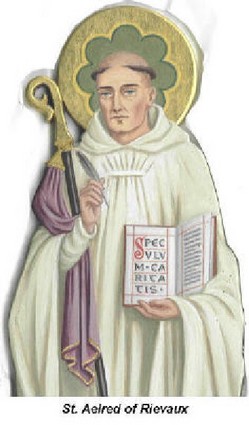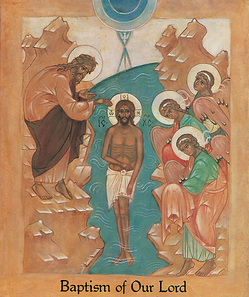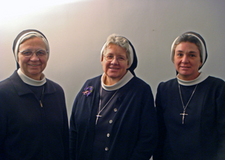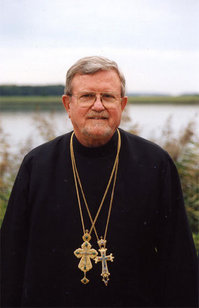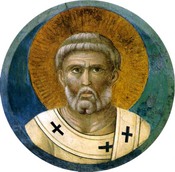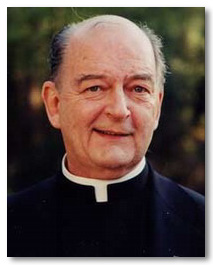On January 7, 2009, His Holiness delivered this address. It bears reading the whole thing. It is excellent, per usual!
In this first general audience of 2009, I want to offer all of you fervent best wishes for the New Year that just began. Let us renew our determination to open the mind and heart to Christ, to be and live as his true friends. His company will make this year, even with its inevitable difficulties, be a path full of joy and peace. In fact, only if we remain united to Jesus will the New Year be good and happy.
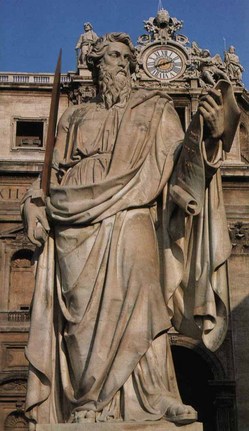 The commitment of union with Christ is the example that St. Paul offers us. Continuing the catecheses dedicated to him, we pause today to reflect on one of the important aspects of his thought, the worship that Christians are called to offer. In the past, there was a leaning toward speaking of an anti-worship tendency in the Apostle, of a “spiritualization” of the idea of worship. Today we better understand that St. Paul sees in the cross of Christ a historical change, which transforms and radically renews the reality of worship. There are above all three passages from the Letter to the Romans in which this new vision of worship is presented.
The commitment of union with Christ is the example that St. Paul offers us. Continuing the catecheses dedicated to him, we pause today to reflect on one of the important aspects of his thought, the worship that Christians are called to offer. In the past, there was a leaning toward speaking of an anti-worship tendency in the Apostle, of a “spiritualization” of the idea of worship. Today we better understand that St. Paul sees in the cross of Christ a historical change, which transforms and radically renews the reality of worship. There are above all three passages from the Letter to the Romans in which this new vision of worship is presented.
1. In Romans 3:25, after having spoken of the “redemption brought about by Christ Jesus,” Paul goes on with a formula that is mysterious to us, saying: God “set [him] forth as an expiation, through faith, by his blood.” With this expression that is quite strange for us — “instrument of expiation” — St. Paul refers to the so-called propitiatory of the ancient temple, that is, the lid of the ark of the covenant, which was considered a point of contact between God and man, the point of the mysterious presence of God in the world of man. This “propitiatory,” on the great day of reconciliation — Yom Kippur — was sprinkled with the blood of sacrificed animals, blood that symbolically put the sins of the past year in contact with God, and thus, the sins hurled to the abyss of the divine will were almost absorbed by the strength of God, overcome, pardoned. Life began anew.
St. Paul makes reference to this rite and says: This rite was the expression of the desire
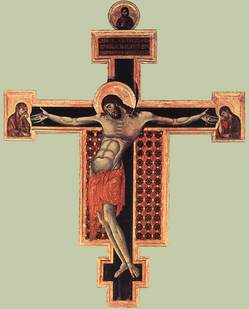 that all our faults could really be put in the abyss of divine mercy and thus made to disappear. But with the blood of animals, this process was not fulfilled. A more real contact between human fault and divine love was necessary. This contact has taken place with the cross of Christ. Christ, Son of God, who has become true man, has assumed in himself all our faults. He himself is the place of contact between human misery and divine mercy; in his heart, the sad multitude of evil carried out by humanity is undone, and life is renewed.
that all our faults could really be put in the abyss of divine mercy and thus made to disappear. But with the blood of animals, this process was not fulfilled. A more real contact between human fault and divine love was necessary. This contact has taken place with the cross of Christ. Christ, Son of God, who has become true man, has assumed in himself all our faults. He himself is the place of contact between human misery and divine mercy; in his heart, the sad multitude of evil carried out by humanity is undone, and life is renewed.
Revealing this change, St. Paul tells us: With the cross of Christ — the supreme act of divine love, converted into human love — the ancient worship with the sacrifice of animals in the temple of Jerusalem has ended. This symbolic worship, worship of desire, has now been replaced by real worship: the love of God incarnated in Christ and taken to its fullness in the death on the cross. Therefore, this is not a spiritualization of the real worship, but on the contrary, this is the real worship, the true divine-human love, that replaces the symbolic and provisional worship. The cross of Christ, his love with flesh and blood, is the real worship, corresponding to the reality of God and man. Already before the external destruction of the temple, for Paul, the era of the temple and its worship had ended: Paul is found here in perfect consonance with the words of Jesus, who had announced the end of the temple and announced another temple “not made by human hands” — the temple of his risen body (cf. Mark 14:58; John 2:19 ff). This is the first passage.
2. The second passage about which I would like to speak today is found in the first verse of Chapter 12 of the Letter to the Romans. We have heard it and I repeat it once again: “I urge you therefore, brothers, by the mercies of God, to offer your bodies as a living sacrifice, holy and pleasing to God, your spiritual worship.”
In these words, an apparent paradox is verified: While sacrifice demands as a norm the death of the victim, Paul makes reference to the life of the Christian. The expression “offer your bodies,” united to the successive concept of sacrifice, takes on the worship nuance of “give in oblation, offer.” The exhortation to “offer your bodies” refers to the whole person; in fact, in Romans 6:13, [Paul] makes the invitation to “present yourselves to God.” For the rest, the explicit reference to the physical dimension of the Christian coincides with the invitation to “glorify God in your bodies” (1 Corinthians 6:20): It’s a matter of honoring God in the most concrete daily existence, made of relational and perceptible visibility.
Conduct of this type is classified by Paul as “living sacrifice, holy and pleasing to God.” It is here where we find precisely the term “sacrifice.” In prevalent use, this term forms part of a sacred context and serves to designate the throat-splitting of an animal, of which one part can be burned in honor of the gods and another part consumed by the offerers in a banquet. Paul instead applied it to the life of the Christian. In fact he classifies such a sacrifice by using three adjectives. The first — “living” — expresses a vitality. The second — “holy” — recalls the Pauline concept of a sanctity that is not linked to places or objects, but to the very person of the Christian. The third — “pleasing to God” — perhaps recalls the common biblical expression of a sweet-smelling sacrifice (cf. Leviticus 1:13, 17; 23:18; 26:31, etc.).
Immediately afterward, Paul thus defines this new way of living: this is “your spiritual worship.” Commentators of the text know well that the Greek expression (tçn logikçn latreían) is not easy to translate. The Latin Bible renders it: “rationabile obsequium.” The same word “rationabile” appears in the first Eucharistic prayer, the Roman Canon: In it, we pray so that God accepts this offering as “rationabile.” The traditional Italian translation, “spiritual worship,” [an offering in spirit], does not reflect all the details of the Greek text, nor even of the Latin. In any case, it is not a matter of a less real worship or even a merely metaphorical one, but of a more concrete and realistic worship, a worship in which man himself in his totality, as a being gifted with reason, transforms into adoration and glorification of the living God.
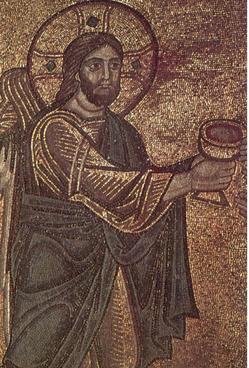 This Pauline formula, which appears again in the Roman Eucharistic prayer, is fruit of a long development of the religious experience in the centuries preceding Christ. In this experience are found theological developments of the Old Testament and currents of Greek thought. I would like to show at least certain elements of this development. The prophets and many psalms strongly criticize the bloody sacrifices of the temple. For example, Psalm 50 (49), in which it is God who speaks, says, “Were I hungry, I would not tell you, for mine is the world and all that fills it. Do I eat the flesh of bulls or drink the blood of goats? Offer praise as your sacrifice to God” (verses 12-14).
This Pauline formula, which appears again in the Roman Eucharistic prayer, is fruit of a long development of the religious experience in the centuries preceding Christ. In this experience are found theological developments of the Old Testament and currents of Greek thought. I would like to show at least certain elements of this development. The prophets and many psalms strongly criticize the bloody sacrifices of the temple. For example, Psalm 50 (49), in which it is God who speaks, says, “Were I hungry, I would not tell you, for mine is the world and all that fills it. Do I eat the flesh of bulls or drink the blood of goats? Offer praise as your sacrifice to God” (verses 12-14).
In the same sense, the following Psalm 51 (50), says, ” …for you do not desire sacrifice; a burnt offering you would not accept. My sacrifice, God, is a broken spirit; God, do not spurn a broken, humbled heart” (verse 18 and following).
In the Book of Daniel, in the times of the new destruction of the temple at the hands of the Hellenistic regime (2nd century B.C.), we find a new step in the same direction. In midst of the fire — that is, persecution and suffering — Azariah prays thus: “We have in our day no prince, prophet, or leader, no holocaust, sacrifice, oblation, or incense, no place to offer first fruits, to find favor with you. But with contrite heart and humble spirit let us be received; As though it were holocausts of rams and bullocks … So let our sacrifice be in your presence today as we follow you unreservedly” (Daniel 3:38ff).
In the destruction of the sanctuary and of worship, in this situation of being deprived of every sign of the presence of God, the believer offers as a true holocaust a contrite heart, his desire of God.
We see an important development, beautiful, but with a danger. There exists a spiritualization, a moralization of worship: Worship becomes only something of the heart, of the spirit. But the body is lacking; the community is lacking. Thus is understood that Psalm 51, for example, and also the Book of Daniel, despite criticizing worship, desire the return of the time of sacrifices. But it is a matter of a renewed time, in a synthesis that still was unforeseeable, that could not yet be thought of.
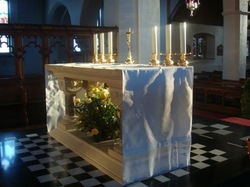 Let us return to St. Paul. He is heir to these developments, of the desire for true worship, in which man himself becomes glory of God, living adoration with all his being. In this sense, he says to the Romans: “Offer your bodies as a living sacrifice … your spiritual worship” (Romans 12:1).
Let us return to St. Paul. He is heir to these developments, of the desire for true worship, in which man himself becomes glory of God, living adoration with all his being. In this sense, he says to the Romans: “Offer your bodies as a living sacrifice … your spiritual worship” (Romans 12:1).
Paul thus repeats what he had already indicated in Chapter 3: The time of the sacrifice of animals, sacrifices of substitution, has ended. The time of true worship has arrived. But here too arises the danger of a misunderstanding: This new worship can easily be interpreted in a moralist sense — offering our lives we make true worship. In this way, worship with animals would be substituted by moralism: Man would do everything for himself with his moral strength. And this certainly was not the intention of St. Paul.
But the question persists: Then how should we interpret this “reasonable spiritual worship”? Paul always supposes that we have come to be “one in Christ Jesus” (Galatians 3:28), that we have died in baptism (Romans 1) and we live now with Christ, through Christ and in Christ. In this union — and only in this way — we can be in him and with him a “living sacrifice,” to offer the “true worship.” The sacrificed animals should have substituted man, the gift of self of man, and they could not. Jesus Christ, in his surrender to the Father and to us, is not a substitution, but rather really entails in himself the human being, our faults and our desire; he truly represents us, he assumes us in himself. In communion with Christ, accomplished in the faith and in the sacraments, we transform, despite our deficiencies, into living sacrifice: “True worship” is fulfilled.
This synthesis is the backdrop of the Roman Canon in which we pray that this offering be “rationabile,” so that spiritual worship is accomplished. The Church knows that in the holy Eucharist, the self-gift of Christ, his true sacrifice, is made present. But the Church prays so that the celebrating community is really united to Christ, is transformed; it prays so that we ourselves come to be that which we cannot be with our efforts: offering “rationabile” that is pleasing to God. In this way the Eucharistic prayer interprets in an adequate way the words of St. Paul.
St. Augustine clarified all of this in a marvelous way in the 10th book of his City of God. I cite only two phrase: “This is the sacrifice of the Christians: though being many we are only one body in Christ” … “All of the redeemed community (civitas), that is, the congregation and the society of the saints, is offered to God through the High Priest who has given himself up” (10,6: CCL 47,27ff).
3. Finally, I want to leave a brief reflection on the third passage of the Letter to the Romans referring to the new worship. St. Paul says thus in Chapter 15: “the grace given me by God to be a minister of Christ Jesus to the Gentiles in performing the priestly service (hierourgein) of the gospel of God, so that the offering up of the Gentiles may be acceptable, sanctified by the holy Spirit” (15:15ff).
I would like to emphasize only two aspects of this marvelous text and one aspect of the unique terminology of the Pauline letters. Before all else, St. Paul interprets his missionary action among the peoples of the world to construct the universal Church as a priestly action. To announce the Gospel to unify the peoples in communion with the Risen Christ is a “priestly” action. The apostle of the Gospel is a true priest; he does what is at the center of the priesthood: prepares the true sacrifice.
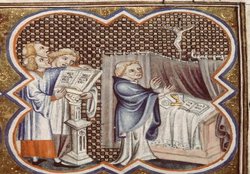 And then the second aspect: the goal of missionary action is — we could say in this way — the cosmic liturgy: that the peoples united in Christ, the world, becomes as such the glory of God “pleasing oblation, sanctified in the Holy Spirit.” Here appears a dynamic aspect, the aspect of hope in the Pauline concept of worship: the self-gift of Christ implies the tendency to attract everyone to communion in his body, to unite the world. Only in communion with Christ, the model man, one with God, the world comes to be just as we all want it to be: a mirror of divine love. This dynamism is always present in Scripture; this dynamism should inspire and form our life. And with this dynamism we begin the New Year. Thanks for your patience.
And then the second aspect: the goal of missionary action is — we could say in this way — the cosmic liturgy: that the peoples united in Christ, the world, becomes as such the glory of God “pleasing oblation, sanctified in the Holy Spirit.” Here appears a dynamic aspect, the aspect of hope in the Pauline concept of worship: the self-gift of Christ implies the tendency to attract everyone to communion in his body, to unite the world. Only in communion with Christ, the model man, one with God, the world comes to be just as we all want it to be: a mirror of divine love. This dynamism is always present in Scripture; this dynamism should inspire and form our life. And with this dynamism we begin the New Year. Thanks for your patience.
